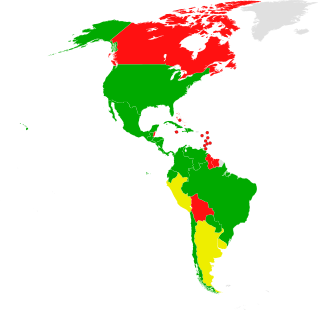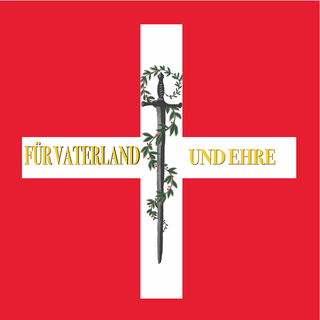The Montreux Convention Regarding the Regime of the Straits is a 1936 agreement that gives Turkey control over the Turkish Straits and regulates the transit of naval warships. The Convention guarantees the free passage of civilian vessels in peacetime, and restricts the passage of naval ships not belonging to Black Sea states. The terms of the Convention have been a source of controversy over the years, most notably about the Soviet Union's military access to the Mediterranean Sea.

The Montevideo Convention on the Rights and Duties of States is a treaty signed at Montevideo, Uruguay, on December 26, 1933, during the Seventh International Conference of American States. The Convention codifies the declarative theory of statehood as accepted as part of customary international law. At the conference, United States President Franklin D. Roosevelt and Secretary of State Cordell Hull declared the Good Neighbor Policy, which opposed U.S. armed intervention in inter-American affairs. The convention was signed by 19 states. The acceptance of three of the signatories was subject to minor reservations. Those states were Brazil, Peru and the United States.

A treaty is a formal written agreement entered into by actors in international law, namely sovereign states and international organizations. A treaty may also be known as an international agreement, protocol, covenant, convention, pact, or exchange of letters, among other terms. Regardless of terminology, only instruments that are binding upon the parties are considered treaties subject to international law.

The Triple Alliance was an agreement between Germany, Austria-Hungary, and Italy. It was formed on 20 May 1882 and renewed periodically until it expired in 1915 during World War I. Germany and Austria-Hungary had been closely allied since 1879. Italy was looking for support against France shortly after it lost North African ambitions to the French. Each member promised mutual support in the event of an attack by any other great power. The treaty provided that Germany and Austria-Hungary were to assist Italy if it was attacked by France without provocation. In turn, Italy would assist Germany if attacked by France. In the event of a war between Austria-Hungary and Russia, Italy promised to remain neutral. The existence and membership of the treaty were well known, but its exact provisions were kept secret until 1919.

The Treaty of Paris of 1815 was signed on 20 November 1815 following the defeat and second abdication of Napoleon Bonaparte. In February, Napoleon had escaped from his exile on Elba; he entered Paris on 20 March, beginning the Hundred Days of his restored rule. After France's defeat at the hands of the British and the Prussians in the Battle of Waterloo, Napoleon was persuaded to abdicate again, on 22 June. King Louis XVIII, who had fled the country when Napoleon arrived in Paris, took the throne for a second time on 8 July.
Succession of states is a theory and practice in international relations regarding successor states. A successor state is a sovereign state over a territory and populace that was previously under the sovereignty of another state. The theory has its root in 19th-century diplomacy. A successor state often acquires a new international legal personality, which is distinct from a continuing state, also known as a continuator, which despite change to its borders retains the same legal personality and possess all its existing rights and obligations.

A neutral country is a state which is neutral towards belligerents in a specific war, or holds itself as permanently neutral in all future conflicts. As a type of non-combatant status, neutral nationals enjoy protection under the law of war from belligerent actions, to a greater extent than other non-combatants such as enemy civilians and prisoners of war.

The Treaty of London of 1839, also called the First Treaty of London, the Convention of 1839, the Treaty of Separation, the Quintuple Treaty of 1839, or the Treaty of the XXIV articles, was a treaty signed on 19 April 1839 between the Concert of Europe, the United Kingdom of the Netherlands and the Kingdom of Belgium. It was a direct follow-up to the 1831 Treaty of the XVIII Articles which the Netherlands had refused to sign, and the result of negotiations at the London Conference of 1838–1839.
The Treaty of Washington was a treaty signed and ratified by the United Kingdom and the United States in 1871 during the first premiership of William Gladstone and the presidency of Ulysses S. Grant. It settled various disputes between the countries, including the Alabama Claims for damages to American shipping caused by British-built warships, as well as illegal fishing in Canadian waters and British civilian losses in the American Civil War. It inaugurated permanent peaceful relations between the United States and Canada, and United States and Britain. After the arbitrators endorsed the American position in 1872, Britain settled the matter by paying the United States $15.5 million, ending the dispute and leading to a treaty that restored friendly relations between Britain and the United States. That international arbitration established a precedent, and the case aroused interest in codifying public international law.
A non-aggression pact or neutrality pact is a treaty between two or more states/countries that includes a promise by the signatories not to engage in military action against each other. Such treaties may be described by other names, such as a treaty of friendship or non-belligerency, etc.
Clausula rebus sic stantibus, is the legal doctrine allowing for a contract or a treaty to become inapplicable because of a fundamental change of circumstances. In public international law the doctrine essentially serves an "escape clause" to the general rule of pacta sunt servanda.

The periods of Restoration and Regeneration in Swiss history last from 1814 to 1847. "Restoration" refers to the period of 1814 to 1830, the restoration of the Ancien Régime (federalism), reverting the changes imposed by Napoleon Bonaparte on the centralist Helvetic Republic from 1798 and the partial reversion to the old system with the Act of Mediation of 1803. "Regeneration" refers to the period of 1830 to 1848, when in the wake of the July Revolution the "restored" Ancien Régime was countered by the liberal movement. In the Protestant cantons, the rural population enforced liberal cantonal constitutions, partly in armed marches on the cities. This resulted in a conservative backlash in the Catholic cantons in the 1830s, raising the conflict to the point of civil war by 1847.

The Treaty of London, often called the Second Treaty of London after the 1839 Treaty, was an international treaty signed on 11 May 1867. Agreed to in the aftermath of the Austro-Prussian War and the Luxembourg Crisis, it had wide-reaching consequences for Luxembourg and for relations between Europe's Great Powers.

The right to food, and its variations, is a human right protecting the right for people to feed themselves in dignity, implying that sufficient food is available, that people have the means to access it, and that it adequately meets the individual's dietary needs. The right to food protects the right of all human beings to be free from hunger, food insecurity and malnutrition. The right to food does not imply that governments have an obligation to hand out free food to everyone who wants it, or a right to be fed. However, if people are deprived of access to food for reasons beyond their control, for example, because they are in detention, in times of war or after natural disasters, the right requires the government to provide food directly.

The European Union (EU) consists of 27 member states. Each member state is party to the founding treaties of the union and thereby shares in the privileges and obligations of membership. Unlike members of most international organisations, the member states of the EU have agreed by treaty to shared sovereignty through the institutions of the European Union in some aspects of government. Member states must agree unanimously for the EU to adopt some policies; for others, collective decision making is by qualified majority voting. Subsidiarity, meaning that decisions are taking collectively if and only if they cannot realistically be taken individually, is a founding principle of the EU.
Minority Treaties refer to the treaties, League of Nations Mandates, and unilateral declarations made by countries applying for membership in the League of Nations and United Nations. Most of the treaties entered into force as a result of the Paris Peace Conference.
The conference of the six Great Powers which met at London in May, 1867, to settle the political order of northern Europe after the disruption of the German Confederation in 1866 is known as the London Conference of 1867. It resulted in the Treaty of London of May 11, 1867. The immediate occasion of the conference was the necessity of settling the status of the Grand Duchy of Luxemburg, which, after the downfall of the First Napoleon, had been added to the dominions of the King of the Netherlands as a separate and independent state and made a member of the German Confederation. Notwithstanding the dissolution of the confederation, Luxemburg continued to be occupied by Prussian troops, the French government insisting upon the removal of these troops and threatening war to enforce the demand.
Swiss neutrality is one of the main principles of Switzerland's foreign policy which dictates that Switzerland is not to be involved in armed conflicts between other states. This policy is self-imposed, permanent, and armed, designed to ensure external security and promote peace.

The League of Nations was established with three main constitutional organs: the Assembly; the Council; the Permanent Secretariat. The two essential wings of the League were the Permanent Court of International Justice and the International Labour Organization.
The United Nations Guiding Principles on Business and Human Rights (UNGPs) is an instrument consisting of 31 principles implementing the United Nations ‘Protect, Respect and Remedy’ framework on this issue of human rights and transnational corporations and other business enterprises. Developed by the Special Representative of the Secretary-General (SRSG) John Ruggie, these Guiding Principles provided the first global standard for preventing and addressing the risk of adverse impacts on human rights linked to business activity, and continue to provide the internationally accepted framework for enhancing standards and practice regarding business and human rights. On June 16, 2011, the United Nations Human Rights Council unanimously endorsed the Guiding Principles for Business and Human Rights, making the framework the first corporate human rights responsibility initiative to be endorsed by the United Nations.











